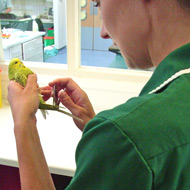
Using nurses to educate clients reduces time pressure on consultations
Joy Howell from Bayer put forward the case for more empowerment for nurses in her joint lecture with Bizzy Allen -McClure at the VPMA/SPVS Congress last week.
There is still the need for a great deal of client education in the basics of pet health care and nurses are in the perfect position to provide this, said Joy. Using nurses to help educate clients, reduces the time pressure on consultations and helps to reduce the acknowledged missed opportunities there are through lack of time in the consulting room.
Bizzy a BVNA council member illustrated this with a case study of her practice. She analysed the total work load of the practice on a day by day basis and then looked at how this could be carried out with nurses and veterinary surgeons sharing the workload.
She looked at procedures such as clinical consults, admissions, post op consults, discharges, weight clinics, health checks and microchipping and her analysis resulted in findings that showed that in the region of 40 -50 per cent of all procedures could have been carried out by qualified nurses.
This is fine in theory, but in reality, as Bizzy pointed out, we all know that there are barriers to running nursing clinics and consults, the main ones being time, scheduling and space. Clearly there needs to be enough team members to provide the sort of services she spoke of, rotas need to be efficiently and carefully managed, and although a dedicated nurses room is ideal, it is quite possible to organise a room rota so that nurses have access to consulting space between clinical consulting times.
The other part of the equation is making sure that all team members are supportive of the work of the nursing team and are willing and able to promote what the nurses can do to clients. If this is carried out, together with careful marketing of nurse clinics using, mail shots, newsletters and the practice website the use of nurses could be significantly increased, helping to reduce the stress on the veterinary surgeon's time and creating more bonded and clinically compliant clients.



 The veterinary mental health charity Vetlife is inviting the veterinary community to join it for a sponsored cold-water dip.
The veterinary mental health charity Vetlife is inviting the veterinary community to join it for a sponsored cold-water dip.